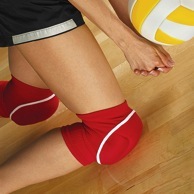-
Skin Conditions


ABC’s of Skin Care
The skin has two basic layers. The outer, protective layer is the epidermis. The thicker, inner layer is the dermis.
About Your Skin
The skin is the body’s largest organ.
-
•It protects tissues inside the body from injury.
-
•It serves as a barrier against chemicals, germs, hot and cold weather, pollution, the sun, etc.
-
•It helps regulate body temperature. It seals in moisture.
Wear knee pads, etc. during sports to help protect your skin from injury.
Don’t share make-up with others.

-
•Moisturize your skin daily and/or when it is dry. Dry, cracked skin lets harmful germs and other irritants in. Use moisturizers that don’t have alcohol.
-
•Protect your skin from the wind and cold weather. Wear gloves, a hat, a scarf, etc.
-
•Protect your skin from injury. Wear gloves when you garden, work with chemicals, etc. When shaving, soften the beard with a warm washcloth. Use plenty of shaving cream. With a sharp blade, shave in the direction of hair growth. Using a back and forth motion causes skin irritation.
-
•Avoid items that cause allergic reactions and/or irritate the skin.
Cosmetic Safety
With so many products to choose from, how do you know which ones are safe to use? How do you know if they give the results they promote?
-
•If you have skin concerns or problems, consult a dermatologist.
-
•Before using a cosmetic, read the label. The label must give directions for safe use and/or warning statements. Heed the warnings. For example, products with an alpha hydroxy acid (AHA) may list the following on the label: “Sunburn alert: This product contains an alpha hydroxy acid (AHA) that may increase your skin’s sensitivity to the sun and the possibility of sunburn. Use a sunscreen and limit sun exposure while using this product and for a week afterwards.”
-
•Follow directions on the label.
-
•Test a small amount of a new product on your skin to find out how your skin reacts to it.
-
•When sampling a cosmetic at a store’s cosmetic counter, test it with a new, unused cotton swab.

-
•Keep make-up containers tightly closed when not in use.
-
•Throw away any cosmetic that has developed an odor or changed color.
-
•If you have an eye infection, such as pink eye, don’t use eye cosmetics. Throw away the ones you were using when you first noticed the infection.
-
•Use products for your skin type (dry, normal, oily, or sensitive, etc.). If you have dry skin, don’t use astringents and products with alcohol. They take moisture away from the skin.

Basic Skin Care
-
•Protect your skin from the sun’s harmful ultraviolet (UV) rays.
-
-Limit exposure to the sun, especially between 10:00 a.m. and 4:00 p.m. standard time; 11:00 a.m. to 5:00 p.m. daylight savings time.
-
-When outdoors, wear a water-resistant sunscreen that has a sun protection factor (SPF) number of at least 15. Use one that protects you from both UVA and UVB rays. Apply sunscreen about 30 minutes before going outside. Use sunscreen as directed on the label.
-
-Wear protective clothing, such as long sleeves and a wide brimmed hat.
-
•Don’t use tanning beds and heat lamps.
-
•Don’t smoke. If you smoke, quit. Smoking can cause premature wrinkles.
-
•Eat healthy foods. Drink plenty of water and other fluids.
-
•Clean your skin daily. Clean it when it gets dirty, too.
-
•Wash your hands often to avoid picking up germs.
-
•Wash your skin with warm (not hot) water. Hot water dries the skin.
-
•Use mild or gentle soaps and cleaning products to prevent dry, irritated skin.




Get more information from:
HealthyLearn® | www.HealthyLearn.com. Click on MedlinePlus®.
American Academy of Dermatology | 888.462.DERM (3376) | www.aad.org



Copyright © 2009, American Institute for Preventive Medicine. All rights reserved.